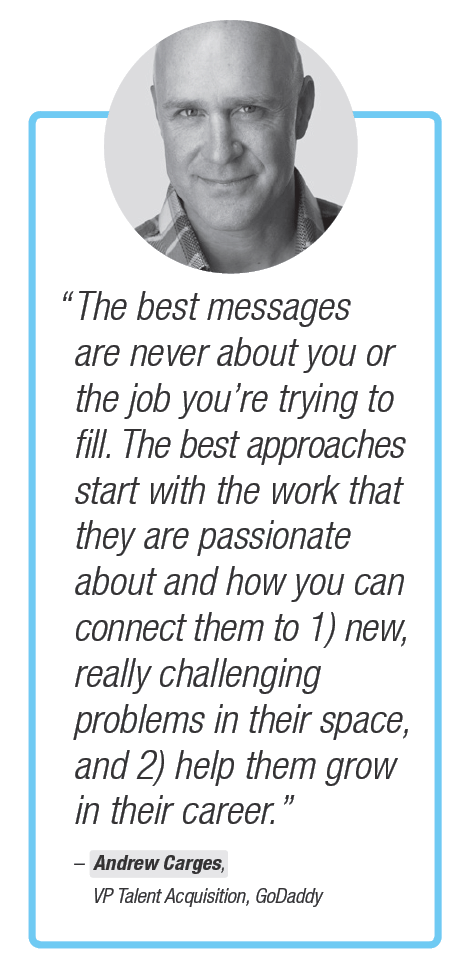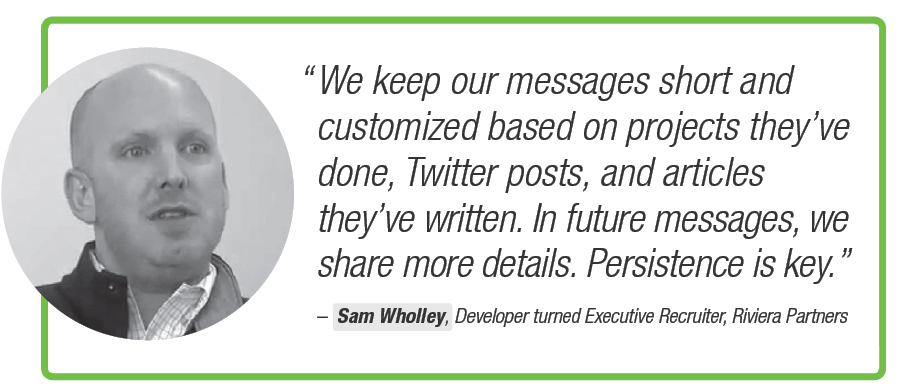
14 meilleures pratiques de recrutement technique pour 2018

The situation in tech changes so fast that as tech recruiters, we need to constantly improve our hiring process. The techniques that worked before may not be as relevant in this age of super competitive labor markets so we have scoured the Internet to find recruitment best practices to help you stay at the forefront of tech recruitment.
Recruitment best practices, what’s the big deal?
To be a successful tech recruiter, it is more important to start with excellent soft skills than it is to start with a business background. In fact, an analysis of recruiters’ LinkedIn profiles found that the number one degree held by recruiters is Psychology and not a business degree. It is to this kind of background that most recruiters add recruitment best practices to score the top technical talent. So what are recruitment best practices?
Simply put, recruitment best practices are techniques that have a track record of getting good results. You can and should develop your own as you gain experience but as Isaac Newton said, “If I have seen further, it is by standing on the shoulders of Giants.” In other words, use these established recruitment best practices to get to the front of the tech recruitment pack.
Create an employer brand that takes care of sourcing
It has been no secret that a strong employer brand has been one of the recruitment best practices that has the biggest impact on the recruitment process, with 82% of leaders believing company culture give them a competitive advantage, according to Deloitte. But in tech, the stakes are much higher.
The kinds of software developers you want to hire, the ones who will do amazing things for your company can get a high paying job just about anywhere. Don’t forget it can cost over $30,000 to hire each dev regardless if they are good or bad. Most of those costs come from sourcing with a longer process leading to more and more productivity losses.
A bad brand will increase all of those costs as the devs you want to hire will go elsewhere. In fact, according to CR Magazine’s Commit! Forum 69% of candidates would not accept a job offer from a company with a bad reputation, even if they were unemployed.
At the other extreme is Google. With a market valuation of over 700 billion dollars, do you know how much they spend sourcing technical hires? Well according to Joel Spolsky, it is pretty much nothing. Google has such a strong employer brand that the best people naturally see them out.
But wait you say, I can’t compete with Google for brand recognition and you’re right but there is still space to build an employer brand which can get developer candidates flooding into your company.
Define the mission and the story of the company
Increasingly devs want to be a part of a goal that is bigger than simply making money. After all, there are plenty of large faceless corporations who have the resources to pay devs a lot but they lack the mission-driven appeal of a company which sells itself on its mission and story, one of the most important recruitment best practices.
In this video, A.J. Mizes explains the approach that they took at Sungevity:
Check out one of the videos they made:
Sungevity was able to effectively communicate what its mission is to potential recruits by presenting the experience of their peers. The company ceases to be a job and has become a community working towards a common goal in the eyes of the engineers who they would like to attract.
Make your space and your company remarkable
En tant que Joel Spolsky puts it, you should want people to remark on the fact that your company is an exceptional place. While showcasing the ping pong tables and food spreads of the first dotcom boom have now become one of the most commonplace recruitment best practices, check out this video of Shopify:
Their office has every conceivable kind of workspace from an indoor cabin to a wood clad library. It seems suited to both individual and collaborative work. Nowhere to be seen are the cubical farms of yesteryear. It is truly a remarkable place which has led to it being ranked the best place to work in Canada by Glassdoor.
Make a name for yourself as a recruiter
Reputations are not only important for the company itself. The types of skills that make someone a great recruiter and make someone a great dev are very different. Devs tend to be collaborative and focus on a project until they can find a solution and prefer predictability. Recruiters, on the other hand, tend to be competitive and are comfortable with regular disruption and ambiguity.
En tant que Joel Spolsky puts it,
“If you are a recruiter you would be a bad programmer. If you are a recruiter, programmers don’t like you because you don’t realize that.”
So to effectively build relationships with devs, you need to employ recruitment best practices like build a personal brand that overcomes the natural suspicion devs might have of a recruiter. A good way to do that is to make sure you have a foundational understanding of the technologies you are recruiting for. You can take this free Tech Recruitment Certification Course to get the information you will need.
Once you know your Angulaire from your AWS, it is important to show the world that you are technically aware. Along with your Tech Recruitment Certified Professional badge that you earn when you complete the course, according to The Definitive Guide to Engaging Top Tech Candidates, it is important to make your social profiles appear attractive and approachable to devs. Ways of doing this include:
- Posting updated summaries and open job descriptions of positions you are currently recruiting for to emphasize your recruiting focus
- Following tech companies and tech leaders
- Posting articles or videos related to your recruiting focus
- Connecting with tech professionals as well as other recruiters
A good example of a recruiter building a strong personal brand is the one Facebook Engineering Recruitment Manager Ambra Benjamin has cultivated on sites like Quora.
 Source : Quora
Source : Quora
By answering questions about technical recruitment, she is developing a reputation as the kind of recruiter devs would want to reach out to, helping her sourcing efforts in the long run.
Talk to people to build relationships
For those of you who are in long-term committed relationships, did they start that way? Did you go up to your partner to be and ask them if they want to get into a long-term relationship with you? Probably not. And the same is true of tech recruitment. Before you send the candidate a job offer or try to sell them on your company, one of the most important but least observed recruitment best practices is to strike up a conversation, get to know them, and soften them up so you can make your pitch when the time is right.
 Source : The definitive guide to engaging passive tech candidates Dice e-book
Source : The definitive guide to engaging passive tech candidates Dice e-book
Target each message to the specific audience you’re trying to reach
Or as Tiffany Kleinpeter of Chatterkick says:
“Don’t just post a job application. Instead, post a message that would catch the eye of your ideal candidate.”
This means finding out exactly what type of developer you are looking for. Maybe they are front-end devs who are passionate about UX or deep into Android. Whichever it is, one of the recruitment best practices you should adopt is to try to hook in the group you are after.
Take this snippet from Salesforce ad for a Principal/Lead Software Engineer – IaaS Compute:
 Source : Salesforce
Source : Salesforce
It doesn’t just start out with qualifications nor does it entice somebody with irrelevant interests. It is designed to speak directly to the people who Salesforce wants to hire for this role.
Hold coding challenges, hackathons, and meetups
The idea behind these is that you develop your company’s reputation as a place that is passionate about the tech it works on. It’s a simple concept that we have covered before.
Just check out this hackathon sponsored by Airbnb:
While it is internal, there is no reason why it couldn’t be open to the public. Not only would a hackathon like this show off the culture and the perks of working for Airbnb, a number of engineers get to work on the actual topics that Airbnb faces.
Leverage candidate’s social graph/trending passions
In 2018, candidates are inundated with generic messages that they routinely ignore. This is especially unacceptable when there is so much information that the candidate shares about their interests and expertise. Ignoring this data means you run the risk of advertising irrelevant positions to your candidates and just becoming another piece of recruiter spam.
 Source : The definitive guide to engaging passive tech candidates Dice e-book
Source : The definitive guide to engaging passive tech candidates Dice e-book
One of the recruitment best practices that you must heed to be successful is to do your homework. On GitHub in particular, you will find a lot of information that you can use to understand what your candidate is passionate about.
Communicate exactly what the position will entail
Software Developer candidates crave information up front. As we mentioned before, they tend to be suspicious of recruitment efforts. They don’t want to be stuck on a team where they are going to be constantly micromanaged or expected to complete whichever project management thinks up that week.
To combat this, recruitment best practices like being explicit with the duties and expectations the candidate will have will go a long way towards reassuring them that the position is one where they will feel fulfilled.
- What the candidate will be doing for you
- What the team is like
- What work culture is like
- What the learning curve is
- What kind of career path the candidate might have
Make your outreach personal and targeted
This is especially true as the market becomes saturated. Any sale person could tell you that a personal targeted message has a much higher possibility of getting a positive response than a generic and spammy one. Tech recruitment is no different.
 Source : The definitive guide to engaging passive tech candidates Dice e-book
Source : The definitive guide to engaging passive tech candidates Dice e-book
Here are a few recruitment best practices that John Vlastelica suggests you can use to get a better response rate from the candidates you contact.
Faire
- Leverage your shared connections and peer networks by mentioning somebody you have in common in your message
- Adapt your message to the medium
- Emails shouldn’t be longer than 2-3 short paragraphs
- Voicemails should be very short and focused, no more than 30-45 seconds
- Facebook Messages should be 2-3 sentences and can often sound much more casual
- Be persistent in following up with candidates
Don’t
- Reach out to devs who aren’t interested in the type of role you are looking for
Use referrals to get better candidates
The devs you already have working for you can be a great resource for finding new candidates. They know the culture at your company and with the right incentives can find a great person. After all, they will have to work with this person and the success of their team will be determined by who is added to it.
To that end, John Vlastelica has some great recruitment best practices for leverageing referrals to your advantage.
Get your top performers to give you referrals
The fact that they are top performers means that they understand the requirements of the team and know what it takes to succeed. They also frequently known other top performing devs so can be a great source of referrals.
Ask all of your devs to leverage their personal networks
It isn’t just your top performers who can be valuable. Try asking all your devs to leverage their personal networks. These could include user groups, alumnae networks, and LinkedIn communities.
Don’t forget to reward referrals
A good way to do this is to get your devs together with some pizza on a Friday afternoon and have them reach out to their personal networks. Make it a positive experience where they are congratulated for making good referrals.
Screen candidates automatically to make the process efficient
On the one hand, the screening stage is meant to eliminate most of the people in your pile. It needs to be done automatically so as to save the time of your technical staff. But done incorrectly, you can end up with false negatives, causing you to lose valuable candidates to poor screening techniques.
Give a tech screen that mirrors the candidate’s first day of work
This does two things. The first and most important is that you get a good indication of your candidate’s ability to do the job. Tests d'échantillons de travail have been found to give the best indication of a candidate’s future abilities. The second is that it will give your candidate an indication of the type of work that they would do for you if they took the job. This transparency can serve to bolster your reputation in their eyes.
DevSkiller is a great tool to use for this role. You can use it to administer a work sample test automatically so that your screen gives you the right indication of the candidate’s performance.
Sell the company in the interview
The interview is not just a trial for the candidate, it is also a chance for you to showcase the values and expertise of your company. Here are a couple of recruitment best practices that can help you sell your candidate on your company while they are selling you on their skills.
Do a code pair with your candidate
This is a great way to ensure the candidate will work well with the rest of the team they will join and is a chance for you to showcase your team. Better yet, by using a business problem that they will face, your candidate will be able to get a taste of exactly what they will be working on if they join your company.
Bring the candidate in to visit the office
This is a great opportunity to give the candidate a feeling of the company and the team. During their visit, they will get to see your office, how people interact, and have an opportunity to meet the rest of the team. It will also be a chance to hold interviews and see if they would be a good fit for the company.
Your offer is more than just money
This means that on the one hand, you can’t buy your way out of your problems. No matter how competitive the salary you offer is, you will not be able to overcome the shortfalls of your hiring process.
But on the other hand, this also means that you can gain a competitive advantage by selling the superior experience you can offer.
Always make your offer competitive
Money isn’t everything, but you still need to give a competitive offer. All the office ping pong tables in the world can’t soothe a 10% pay cut. If you don’t head any of the other recruitment best practices in this post, at least remember this one: Always start with your best offer. If you don’t, you can bet that there is a company with a great culture that also pays the market rate. Try to be that company.
“It’s difficult for companies to go back to the well a second time,” Wayne Rampey, CEO of Apollo Staffing
So start with your best offer but that shouldn’t be everything you have. Here are a couple of recruitment best practices you can use as sweeteners to sell the position.
- Sell them on being part of something amazing
Software devs want to be engaged in interesting projects that make a difference. That can be the differences between you and all of the other competitive offers they have been given. - Offer a complete package
This includes equity, benefits, vacation time, and other ancillary benefits.
Where to go from here
A good way to catch up with the latest tech recruitment best practices is by taking our free Tech Recruitment Certification Course. We have prepared it to give both people new to the field and veterans who want to brush up on their technical knowledge a complete set of tech recruitment best practices that will help them recruit the best devs in 2018.




